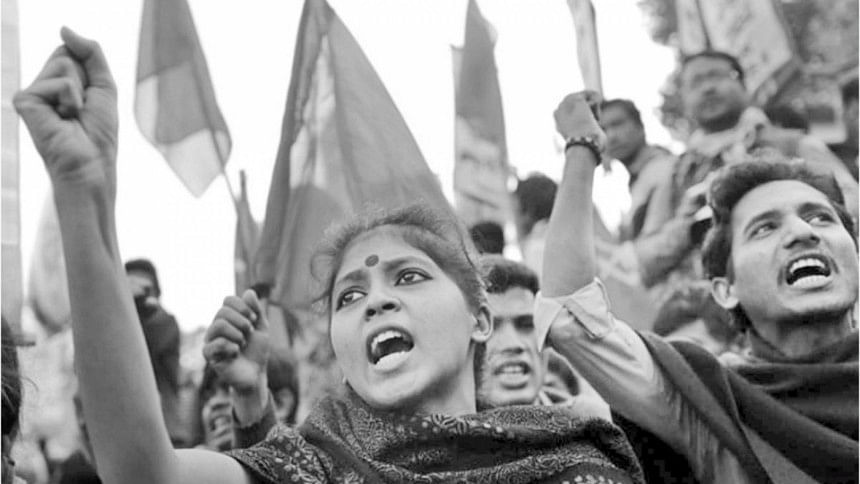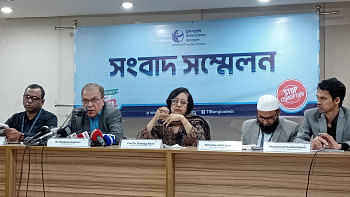16 Days of Activism To End Violence against Women - Making a Lifetime Commitment

At a workshop on preventing gender-based violence in universities, we asked students why women experience sexual harassment on campus. "It's the ones who don't dress conservatively," said one young man, "they are too free." "It's because they talk too much," said another, "they are too open." "No," said one young woman, "that's not true. I'm quiet and I get harassed." "No," said another young woman, "I get harassed when I'm in full hijab and when I wear jeans." "No," said a third woman. "My three-year-old neighbour was raped inside her own home."
Bangladesh is not alone in regulating what women should and shouldn't do to be free from violence. Around the world, countries, cultures, religions, ethnicities, languages prescribe detailed codes of dress, behaviour, speech that prescribe women's lives as if this will prevent violence. Yet, according to a 2013 WHO report, at least 35 percent of women worldwide have experienced either physical and/or sexual violence. Countries courageous enough to undertake their own surveys have found much higher rates. In 2013, the Bangladesh Bureau of Statistics (BBS) with support from UNFPA released a national survey of violence against women that found that 87 percent of ever married women have experienced some form of violence in their lifetime with 77 percent reporting violence in the past 12 months. A 2013 study conducted in 8 universities by UN Women found that 76 percent of women students have experienced gender based violence. A 2007 study in Dhaka city that found that 11 percent of office women staff, 29 percent of school teachers, 85 percent of garment workers and 100 percent of day labourers experienced physical, psychological and sexual harassment in their workplace.
These statistics force us to recognise that although Bangladesh has come a long way on several indicators of gender equality, including the reduction of maternal mortality and achievement of parity in primary and lower secondary school, there is a long road ahead.
Violence against women is an expression of the deep structural inequalities that limit the life chances for women in Bangladesh. It is one of many such expressions such as the fact that less than 40 percent of women participate in the labour force in Bangladesh whereas 85 percent of men do. When women do participate, they earn an average of 52 percent of what men do. Bangladesh has one of the highest rates of child marriage in the world where today 1 in 3 Bangladeshi girls aged 15-19 are married.
It is easy to think that when we are not perpetrators of physical assault or sexual harassment, it is not our problem. But it is. The fear of violence creates an unequal society where women and girls cannot participate and contribute equally and all of us lose as a result. How many women do you see on crowded public buses? How free are women to bring information about family needs into discussions of health care, climate change or local budget allocations? How many girls are at the neighbourhood youth centre or football field? How many women join the line of men praying on the street during the evening namaaz? How many women stand at the corner tea stall, laughing over a cup of tea? How many women come streaming out of office buildings at evening rush hour? The fear of violence prevents women from being equal citizens. And it is only in recognising that this is a loss for all of us can we begin to solve this problem. The solution has to be at all levels, involving every actor – institutional and individual.
In 2009, the Bangladesh High Court issued powerful directives directing all workplaces and educational institutions to develop and implement measures to end violence against women, with a focus on preventing violence before it happens. Yet, in spite of strong commitment in many offices and on many campuses, implementation remains weak. This is where we must act as institutions. A draft law sits ready to be discussed and passed in Parliament that will make the country's actions to end violence against women stronger and give guidance to those that would like to see women free to participate in education and economic development. This is where we must act as policymakers, and where citizens must demand answers.
And perhaps most importantly, Bangladeshi civil society has not been silent. The protests against the violence during Pahela Boishakh, the vociferous campaigns, marches and social media outrage are all clear indications that Bangladeshis have had enough and want to end violence against women. We must all be part of these protests, we must protest in our own lives, in our own homes and in our own schools, colleges and workplaces. We must speak up when our friends harass women, we must speak up when our aunts and uncles want to marry off their underage daughters and we must play our part in making public spaces safe for women. Laws and policies are essential but ultimately, it will be our own actions that will create a society where every woman and every girl is truly, gloriously, fully free.
Jointly written by UNFPA and UN Women to mark the 16 days of activism against Gender Based Violence campaign taking place between the 25th of Novermber and 10th of December.

 For all latest news, follow The Daily Star's Google News channel.
For all latest news, follow The Daily Star's Google News channel. 



Comments